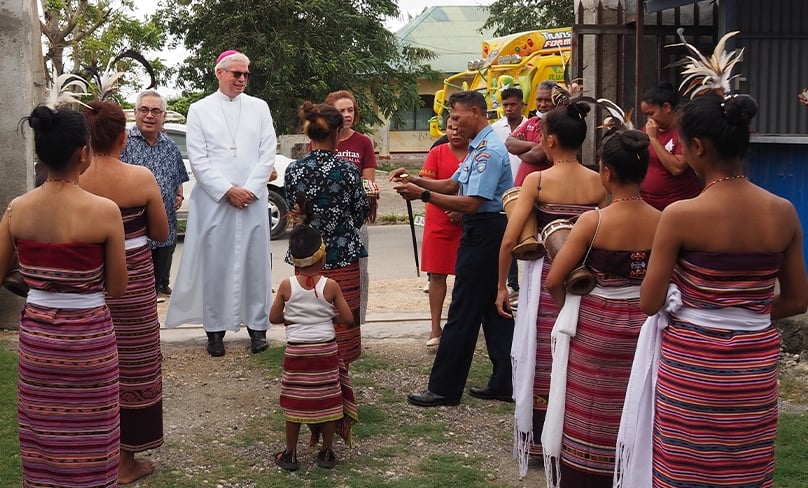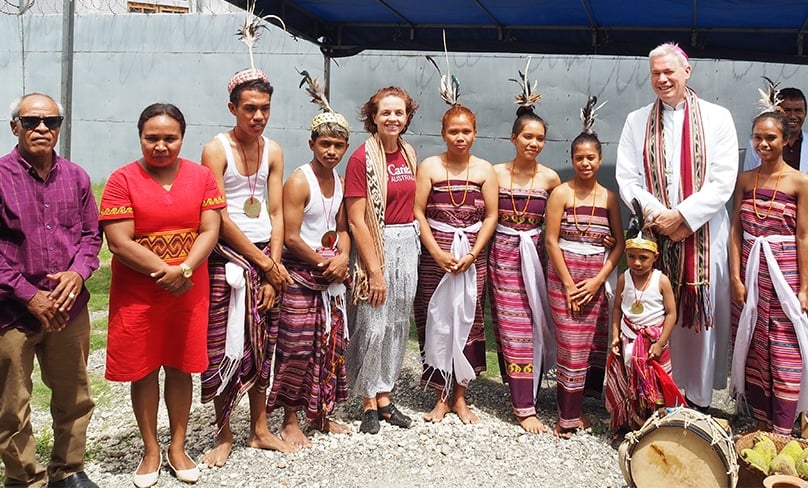
Violence across all facets of life has been part of the fabric of Timor-Leste for the past half-century.
After the struggle to gain independence from Portugal in 1975 and the following decades living under the shadow of a brutal Indonesian regime, it was almost inevitable that this violent and bitter struggle for freedom would eventually bleed into the home, where trauma and anger is now a permanent fixture in family life.
In a culture that has that has experienced so much violence, communities in Timor-Leste are now used to dealing with their problems through aggression, with the result playing out in people’s homes.
According the United Nations, almost 60 per cent of women in Timor-Leste will experience physical or sexual violence during their lifetimes, with nearly half – 46 per cent – experiencing domestic violence each year.
“It’s very hard for women in Timor to leave their home, it’s very hard because they have no income …”
Caritas Australia CEO Kirsty Robertson has found it’s a problem that’s exploded over the past decade, spurring Caritas to respond to address the needs of Timorese women and children.
“It’s very hard for women in Timor to leave their home, it’s very hard because they have no income, they have no support, outside of the family network,” Mrs Robertson said.
To help tackle the problem Caritas Australia provides the funding for the Uma PAS Women’s Shelter in Bacau to provide a safe place for women to go with their children when they need to flee their homes due to sexual or domestic violence.
Timor-Leste’s second largest city, Bacau, is home to more than 20,000 people, with an additional 200,000 in the surrounding province.

In a country with no public housing or social safety net, victims of domestic and sexual violence – until now – have been trapped, forced to choose between tolerating domestic violence or poverty and homelessness.
Since the creation of the Caritas Uma PAS Shelter, victims in Bacau now have access to crisis accommodation and a one-of-a-kind centre where women are taught the skills and knowledge they need to gain employment and financially support themselves.
“It’s not enough to provide women and children with a safe place, with the bed to sleep in, because at the end of the day what happens tomorrow? The work of Caritas is about setting up these women for life,” Mrs Robertson said.
Bacau local and Uma PAS Director Felismenia Belo operates the shelter seven days a week, describing it as the one safest places in the entire city.
“Sometimes I am sad, because the women … they come and there’s no bed to use …”
With limited resources, Felismenia is plagued by anxiety due to the number of women and children the shelter is forced to help find accommodation for in other parts of Timor-Leste.
“Sometimes I am sad, because the women … they come and there’s no bed to use so that sometimes, it makes me sad. We have only one working car, because the second car is not in good condition, and there are not many staff to have,” Mrs Belo said.
The shelter is calling on greater Australian assistance, through Caritas, to help purchase a larger, more permanent building for more families fleeing violence, along with funding for more staff and vehicles to help women relocate to other parts of the country.
